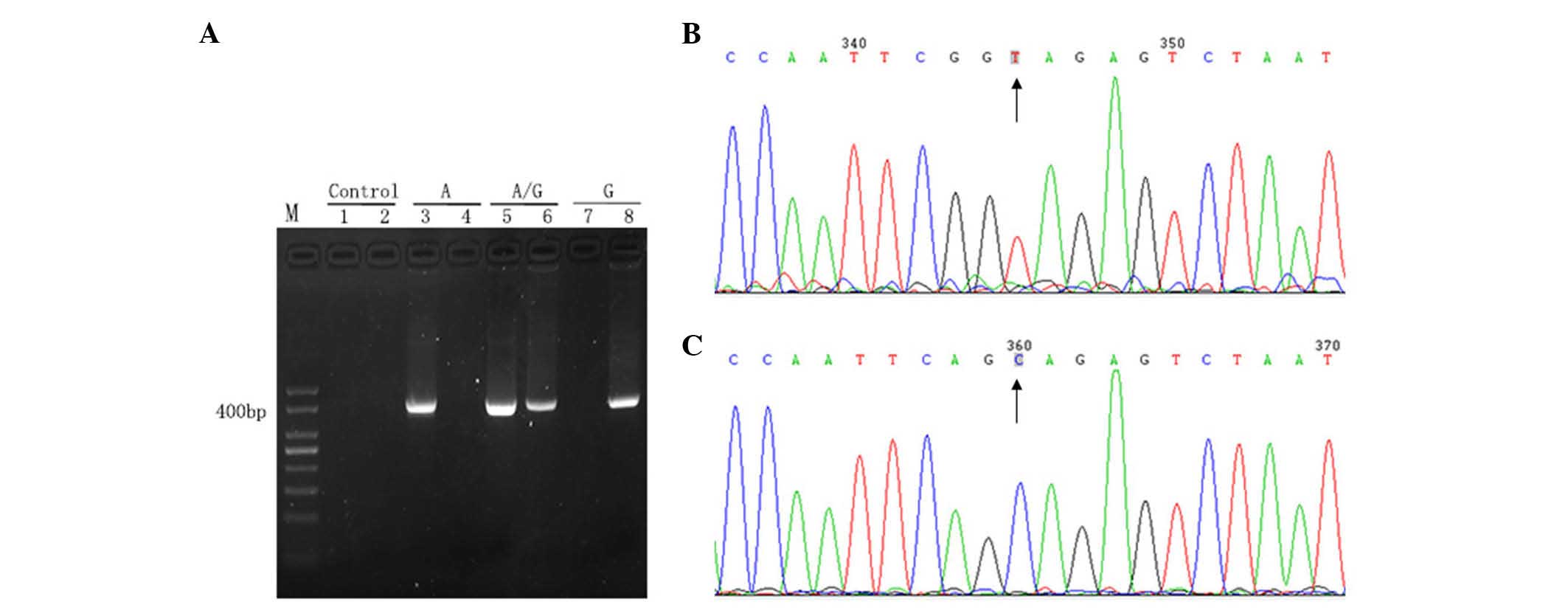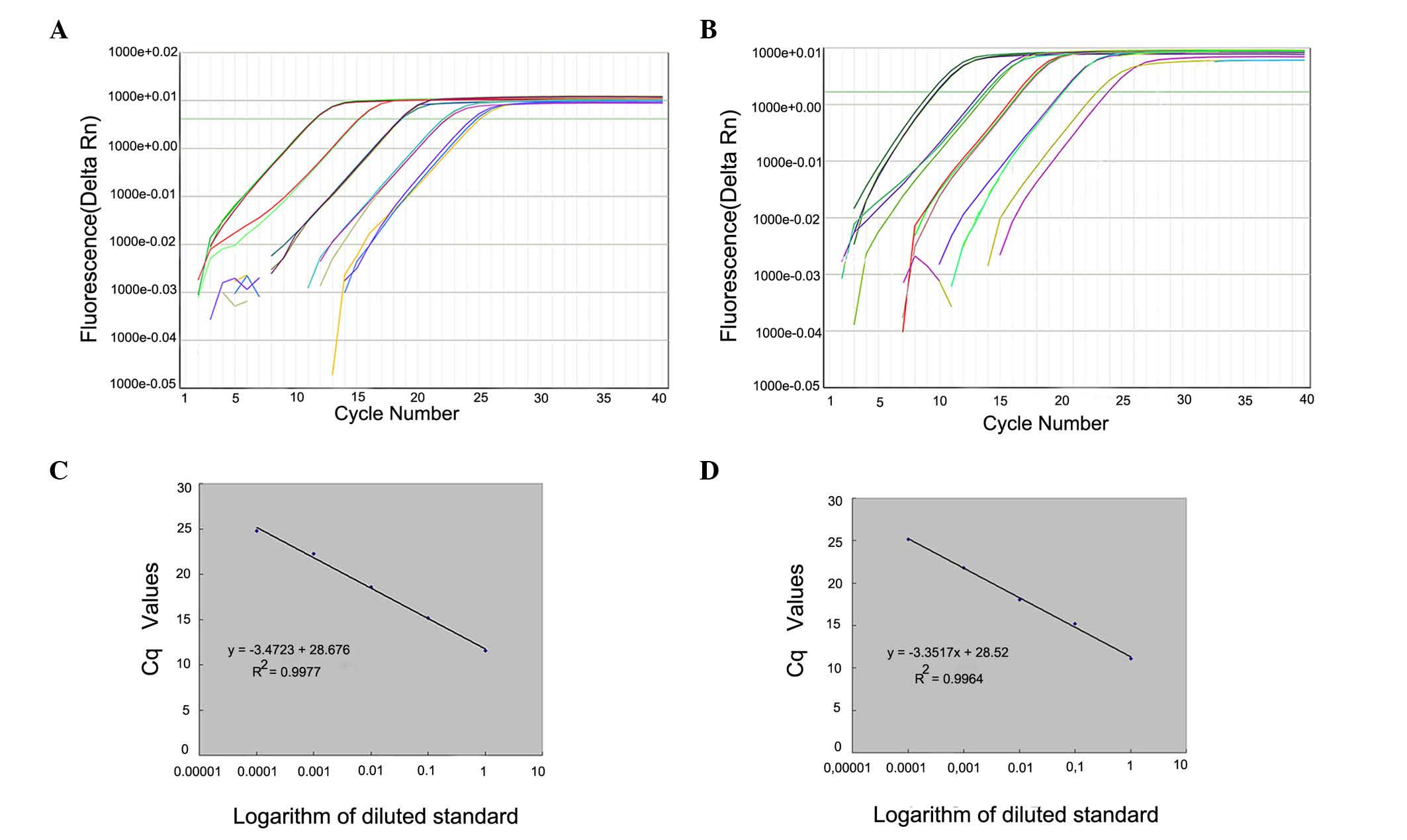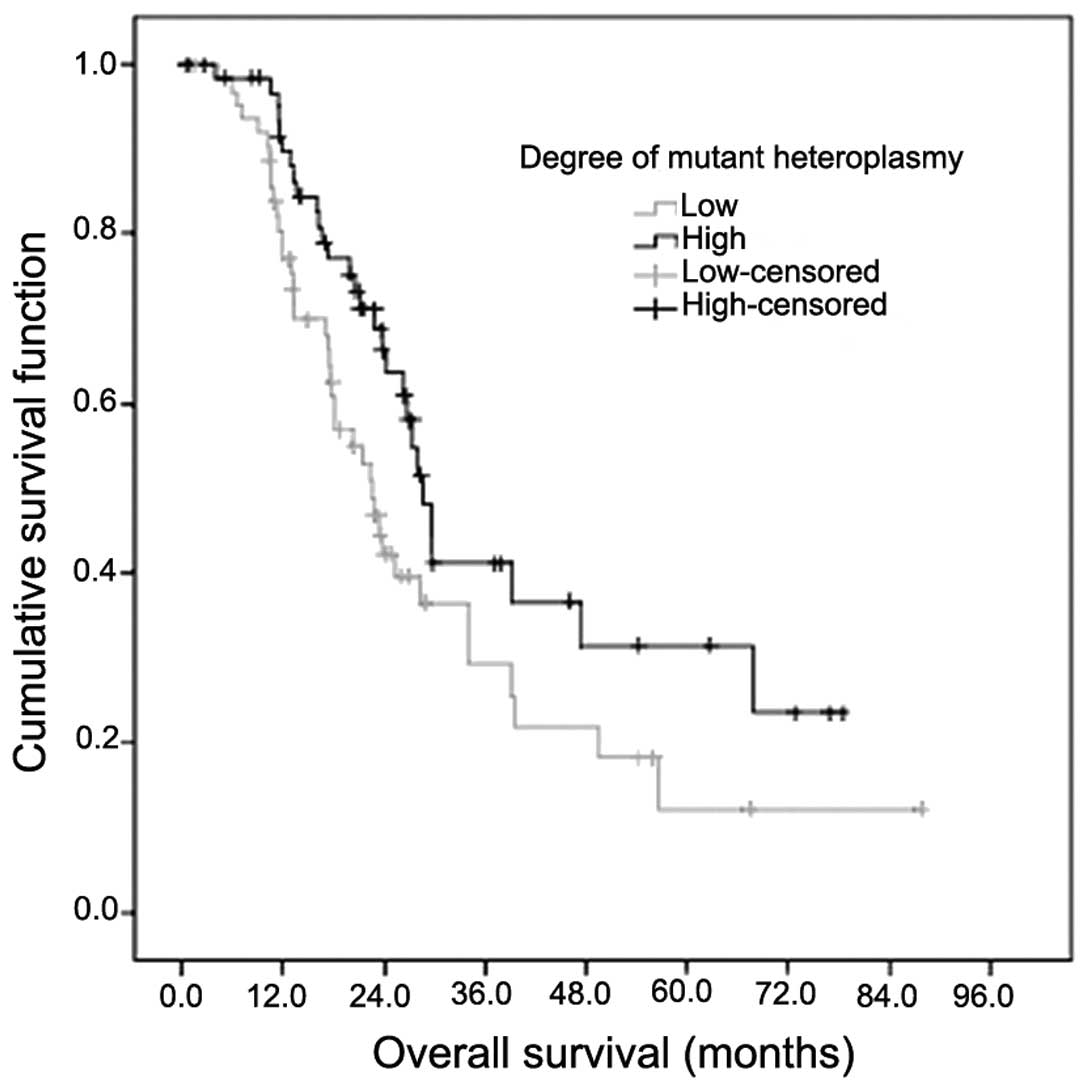|
1
|
Wallace DC, Fan W and Procaccio V:
Mitochondrial energetics and therapeutics. Annu Rev Pathol.
5:297–348. 2010. View Article : Google Scholar : PubMed/NCBI
|
|
2
|
Sanchez-Aragó M, Chamorro M and Cuezva JM:
Selection of cancer cells with repressed mitochondria triggers
colon cancer progression. Carcinogenesis. 31:567–576. 2010.
View Article : Google Scholar : PubMed/NCBI
|
|
3
|
Johns DR: Seminars in medicine of the Beth
Israel Hospital, Boston. Mitochondrial DNA and disease. N Engl J
Med. 333:638–644. 1995.PubMed/NCBI
|
|
4
|
Schon EA: Mitochondrial genetics and
disease. Trends Biochem Sci. 25:555–560. 2000. View Article : Google Scholar : PubMed/NCBI
|
|
5
|
Bai RK and Wong LJ: Detection and
quantification of heteroplasmic mutant mitochondrial DNA by
real-time amplification refractory mutation system quantitative PCR
analysis: A single-step approach. Clin Chem. 50:996–1001. 2004.
View Article : Google Scholar : PubMed/NCBI
|
|
6
|
Larsen NB, Rasmussen M and Rasmussen LJ:
Nuclear and mitochondrial DNA repair: Similar pathways?
Mitochondrion. 5:89–108. 2005. View Article : Google Scholar : PubMed/NCBI
|
|
7
|
Rozwodowska M, Drewa G, Zbytniewski Z,
Woźniak A, Krzyzyńska-Malinowska E and Maciak R: Mitochondrial
diseases. Med Sci Monit. 6:817–822. 2000.PubMed/NCBI
|
|
8
|
Wallace DC: The mitochondrial genome in
human adaptive radiation and disease: On the road to therapeutics
and performance enhancement. Gene. 354:169–180. 2005. View Article : Google Scholar : PubMed/NCBI
|
|
9
|
Wallace DC: Mitochondrial DNA mutations in
disease and aging. Environ Mol Mutagen. 51:440–450. 2010.PubMed/NCBI
|
|
10
|
Lin CS, Wang LS, Tsai CM and Wei YH: Low
copy number and low oxidative damage of mitochondrial DNA are
associated with tumor progression in lung cancer tissues after
neoadjuvant chemotherapy. Interact Cardiovasc Thorac Surg.
7:954–958. 2008. View Article : Google Scholar : PubMed/NCBI
|
|
11
|
Choi SJ, Kim SH, Kang HY, Lee J, Bhak JH,
Sohn I, Jung SH, Choi YS, Kim HK, Han J, et al: Mutational hotspots
in the mitochondrial genome of lung cancer. Biochem Biophys Res
Commun. 407:23–27. 2011. View Article : Google Scholar : PubMed/NCBI
|
|
12
|
Pezzotti A, Kraft P, Hankinson SE, Hunter
DJ, Buring J and Cox DG: The mitochondrial A10398G polymorphism,
interaction with alcohol consumption and breast cancer risk. PLoS
One. 4:e53562009. View Article : Google Scholar : PubMed/NCBI
|
|
13
|
Jin X, Zhang J, Gao Y, Ding K, Wang N,
Zhou D, Jen J and Cheng S: Relationship between mitochondrial DNA
mutations and clinical characteristics in human lung cancer.
Mitochondrion. 7:347–353. 2007. View Article : Google Scholar : PubMed/NCBI
|
|
14
|
Zu-Jian C, Bin Y, Qi-Cai L, Lin J, Jing C
and Qi-Shui O: Quantification of mitochondrial DNA with the A1555G
mutation in deaf patients using real-time amplification refractory
mutation system-quantitative PCR. J Mol Diagn. Dec 3–2009.(Epub
ahead of print). PubMed/NCBI
|
|
15
|
Newton CR, Graham A, Heptinstall LE,
Powell SJ, Summers C, Kalsheker N, Smith JC and Markham AF:
Analysis of any point mutation in DNA. The amplification refractory
mutation system (ARMS). Nucleic Acids Res. 17:2503–2516. 1989.
View Article : Google Scholar : PubMed/NCBI
|
|
16
|
Beasley MB, Brambilla E and Travis WD: The
2004 World Health Organization classification of lung tumors. Semin
Roentgenol. 40:90–97. 2005. View Article : Google Scholar : PubMed/NCBI
|
|
17
|
Livak KJ and Schmittgen TD: Analysis of
relative gene expression data using real-time quantitative PCR and
the 2(−Delta Delta C(T)) Method. Methods. 25:402–408. 2001.
View Article : Google Scholar : PubMed/NCBI
|
|
18
|
Venegas V and Halberg MC: Quantification
of mtDNA mutation heteroplasmy (ARMS qPCR). Methods Mol Biol.
837:313–326. 2012. View Article : Google Scholar : PubMed/NCBI
|
|
19
|
Kulawiec M, Owens KM and Singh KK: mtDNA
G10398A variant in African-American women with breast cancer
provides resistance to apoptosis and promotes metastasis in mice. J
Hum Genet. 54:647–654. 2009. View Article : Google Scholar : PubMed/NCBI
|
|
20
|
Canter JA, Kallianpur AR, Parl FF and
Millikan RC: Mitochondrial DNA G10398A polymorphism and invasive
breast cancer in African-American women. Cancer Res. 65:8028–8033.
2005.PubMed/NCBI
|
|
21
|
Lee HC, Chang CM and Chi CW: Somatic
mutations of mitochondrial DNA in aging and cancer progression.
Ageing Res Rev. 9(Suppl 1): S47–S58. 2010. View Article : Google Scholar : PubMed/NCBI
|
|
22
|
Xu H, He W, Jiang HG, Zhao H, Peng XH, Wei
YH, Wei JN, Xie CH, Liang C, Zhong YH, et al: Prognostic value of
mitochondrial DNA content and G10398A polymorphism in non-small
cell lung cancer. Oncol Rep. 30:3006–3012. 2013.PubMed/NCBI
|
|
23
|
Wong LJ and Bai RK: Real-time quantitative
polymerase chain reaction analysis of mitochondrial DNA point
mutation. Methods Mol Biol. 335:187–200. 2006.PubMed/NCBI
|
|
24
|
Zhu Y, Huang S, Kang D, Han M, Wang G,
Yuan Y, Su Y, Yuan H, Zhai S and Dai P: Analysis of the
heteroplasmy level and transmitted features in hearing-loss
pedigrees with mitochondrial 12S rRNA A1555G mutation. BMC Genet.
15:262014. View Article : Google Scholar : PubMed/NCBI
|
|
25
|
Warowicka A, Kwasniewska A and
Gozdzicka-Jozefiak A: Alterations in mtDNA: A qualitative and
quantitative study associated with cervical cancer development.
Gynecol Oncol. 129:193–198. 2013. View Article : Google Scholar : PubMed/NCBI
|
|
26
|
Sobenin IA, Mitrofanov KY, Zhelankin AV,
Sazonova MA, Postnov AY, Revin VV, Bobryshev YV and Orekhov AN:
Quantitative assessment of heteroplasmy of mitochondrial genome:
Perspectives in diagnostics and methodological pitfalls. Biomed Res
Int. 2014:2920172014. View Article : Google Scholar : PubMed/NCBI
|

















